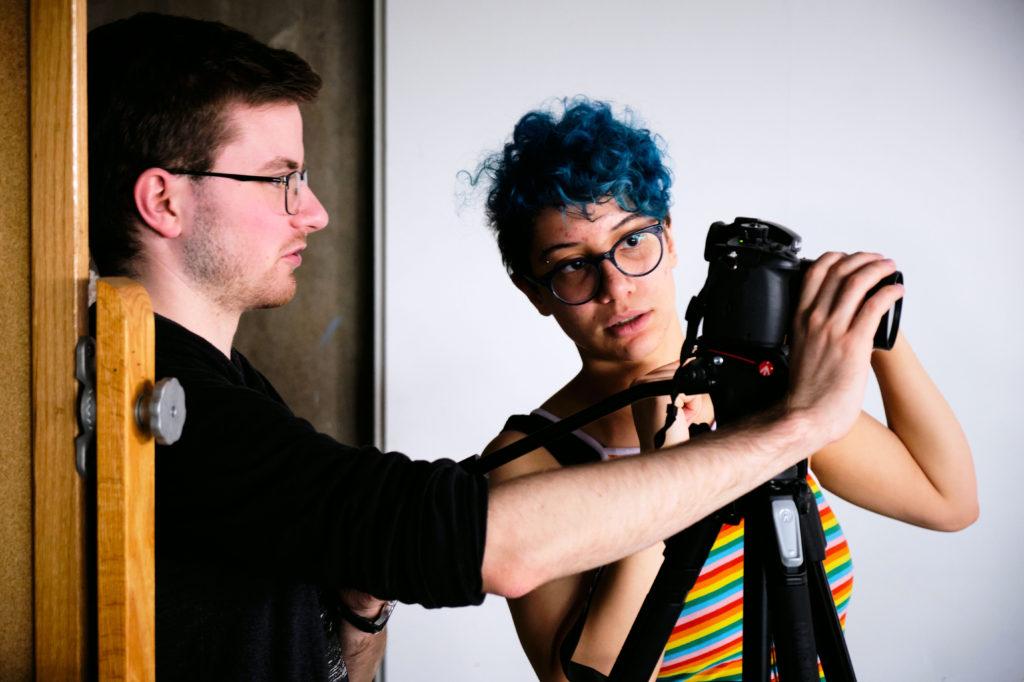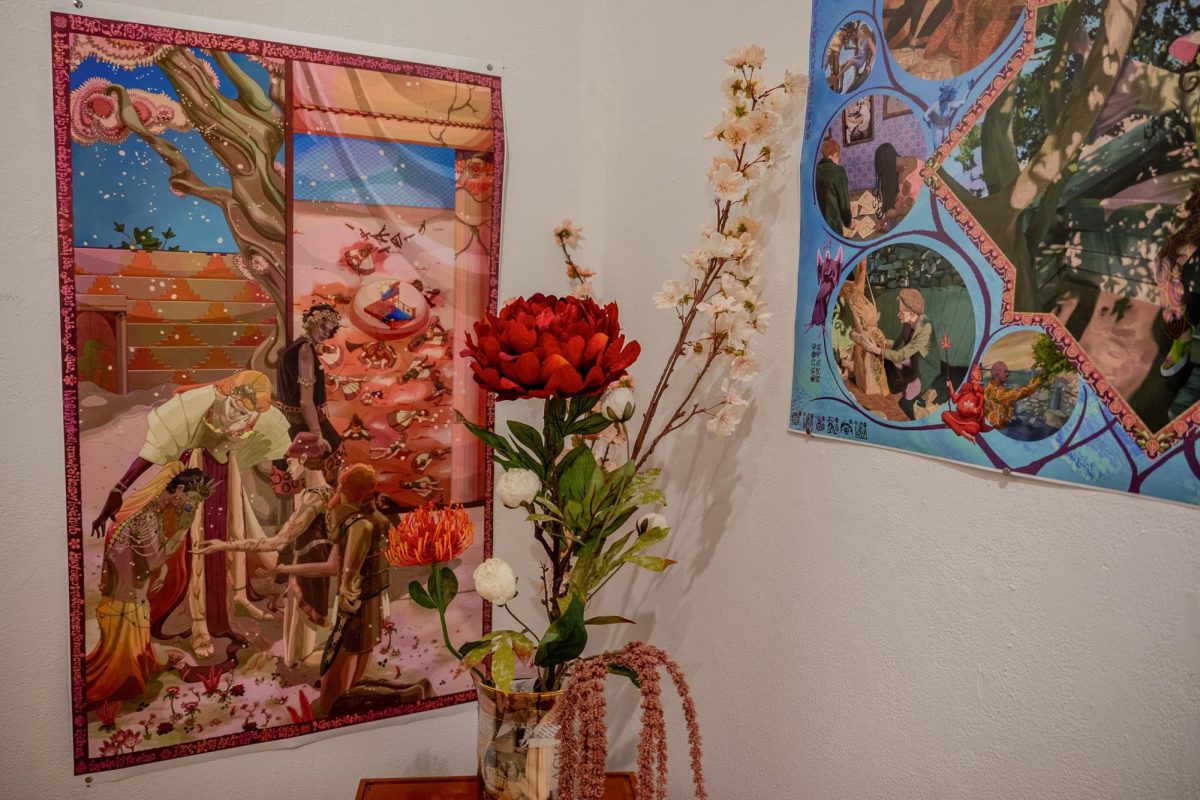By Ellianna Cierpiot
cierpiot@grinnell.edu
Over the years, film has been integrated into many disciplines at Grinnell, from Russian, French and German film to feminist film theory. For students who have a strong interest in filmmaking, or in the hands-on production aspects of film, however, the lack of a cohesive program for film studies can be limiting, as pointed out by a 2016 petition and an opinion piece in the S&B in 2017.
The newly approved film and media studies concentration, which was approved by Grinnell faculty on Dec. 6, 2021, will codify the available film classes and add new courses.
“We have these rich course offerings dispersed throughout the curriculum. So now we’re bringing this curricular structure to those courses and adding new courses that are focused on film and media production and film studies,” said professor of film and media studies Nicky Tavares, who was hired at Grinnell in 2019 to spearhead the creation of the department. “So far, we’ve added Fundamentals of Video Production and Intro to Film Studies, so those have been regularized and they will serve as the core of the curriculum and then we can draw on these other course offerings across the campus across different departments to fulfill the concentration.”
Tavares says that the ethos of the newly approved film and media studies concentration is combining the study of film theory with the hands-on practice of creating meaningful video projects. She said that most of the expansion that will be done regarding course offerings for the concentration will focus on production.
“I think it’s important to understand that the College envisions a program that emphasizes practice grounded in theory and rounded out by the wider Grinnell liberal arts experience … so we want to focus on media production,” Tavares said.
Although there are currently classes that focus on video production, the concentration’s emphasis on it will expand the kinds of projects that students can undertake, such as larger crew productions that involve many people.
“Students are really discovering their own original creative voices within the context of these courses, so that’s the main focus of production courses [that] are grounded in their unique interests,” Tavares said.
Isidro Mendizibal `23, who has taken multiple film classes at Grinnell since they have begun to be offered, said the resources and assignments available to him have had more of a focus on individualized work rather than collaboration.
“It was making some sort of personal project in a way that’s sort of like poetry with image, which leads itself to be a little bit more experimental and it strays away from working with actors, for example,” Mendizibal said.
He also pointed out that the complexity of the medium makes it difficult to work on independently without the support of an existing film program.
“The thing is, there’s so many aspects in movies,” Mendizibal said. “The medium is hyper-complex because … it’s a confluence of so many things. So it’s literature and narrative … And putting that in a way that’s sort of as aesthetic as painting. And then you have the whole aspect of acting and theater and doing things with the body.”
Digital Equipment Manager Ethan Nelson also said that the addition of the concentration will allow students to create more sophisticated projects.
“Right now, we’ve got enough to cover documentary filmmaking and smaller scale stuff,” Nelson said. “But I think that we’re expanding to kind of accommodate all the different styles.”
He predicts that as students’ work increases in complexity, his job will as well.
“Well, the types of questions I will get will definitely expand because it will go from, ‘Hey, how do I shoot this thing in my dorm room over a weekend?’ to ‘Hey, we’ve got a ten-person crew. How do we wrangle the actors? How do we set up six or seven lights and light up a house?’” Nelson said.
Currently, Grinnell doesn’t have the video production equipment required for larger-scale projects.
“So far we have some pretty slick camera packages,” Tavares said. “But they’re, you know, they’re not at the Netflix-approved sort of level. So that’s where we hope to grow.”
According to Nelson, the plan is to move from the current offering of 4k cameras and their associated equipment to cameras that shoot in 6k with raw recording, which is much closer to what is used in the professional film industry.
For now, though, the film and media studies concentration also accepts credits from programs that have the infrastructure to support the projects that Grinnell currently cannot.
“We will also honor up to nine study abroad credits,” Tavares said. “So certain programs like FAMU in Prague focus on production in a way that we are not yet able to focus on [it] … so it’s a great way for students to enhance or supplement what they learn here and then as our program grows, we hope to offer more advanced crew-based production courses.”
The requirements for the film and media concentration will include 8 credits in core courses, such as Introduction to Film Studies, 12 elective credits that are from both Production and Theory areas of study, and a 4-credit seminar or MAP.
These courses will look at films from different places, perspectives and time periods, which Tavares stressed the significance of.
“I think it’s important to watch films from non-Western traditions,” Tavares said. “I think it’s important to balance, so to create opportunities to see films by those who are historically underrepresented.”
One of the ways that this is being addressed is through the Grinnell College Film Society, which is an initiative meant to support the concentration by bringing in filmmakers with diverse voices, according to Tavares. While many of these events have been virtual, on Mar.11, they will be hosting Afro-surrealist filmmaker Christopher Harris, who will present and discuss his experimental short films.
“It’s important to acknowledge that there is an established film canon and part of our work as film scholars and makers is to actually critically interrogate that canon,” said Tavares. “We’re acknowledging that while introducing and elevating new voices.”



























































Mariah Hibarger • Mar 5, 2022 at 8:08 am
This is awesome news for the College. Thank you for sharing!